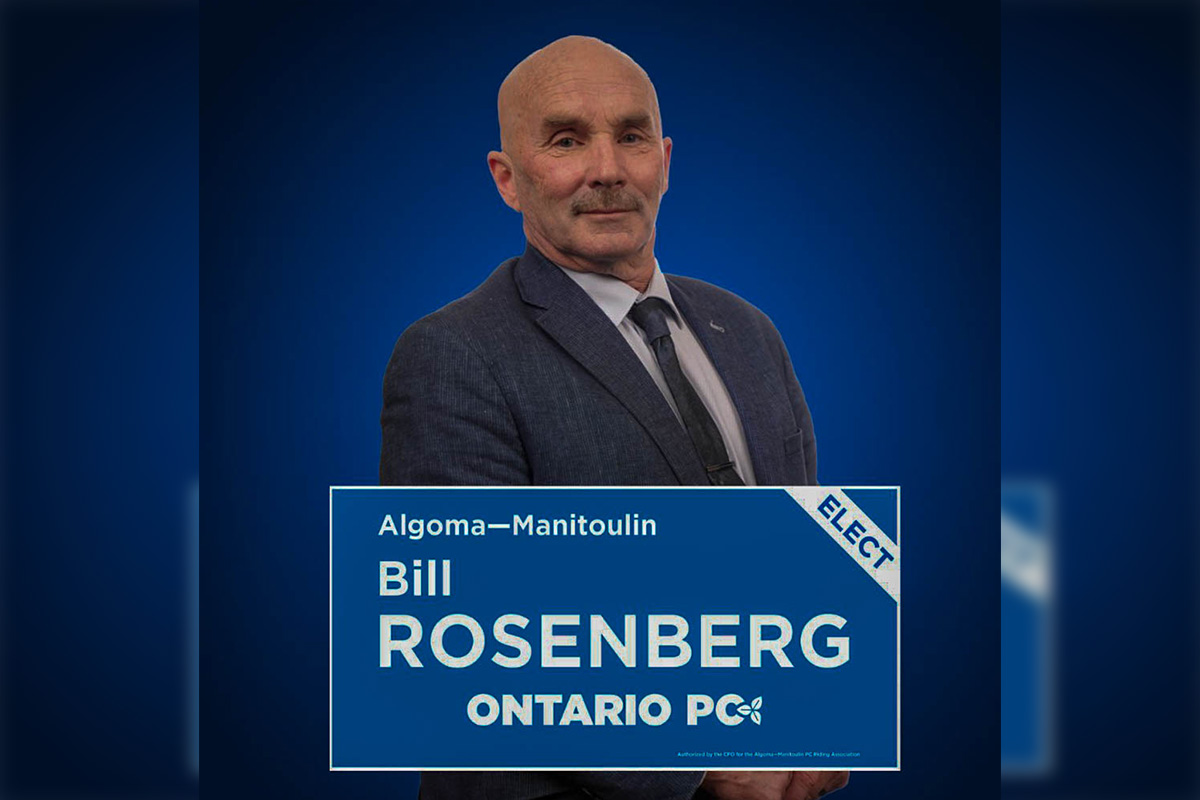Each week until the lead up of the provincial election, February 27, The Expositor is posing a question to each of the five candidates running to be the next MPP of Algoma-Manitoulin. This week’s question is:
The Association of Municipalities of Ontario (AMO) recently released its Homelessness Report. In it AMO shared the startling statistics that there are more than 80,000 homeless in Ontario, a number that has grown 25 percent since 2022. Without intervention, homelessness in Ontario could double in the next decade and reach nearly 300,000, AMO reports. What is your party’s plan to address the housing crisis, specifically in Northern Ontario?
Maria Legault,
Green Party of Ontario

Chose not to respond
Michael Mantha,
Independent

For decades, Ontarians considered homelessness as a problem primarily experienced in larger urban areas in southern Ontario. The issue was less obvious to people in Northern Ontario. The truth is that homelessness has existed and has been growing across Algoma-Manitoulin.
The statistics in the question above show Ontario’s homelessness rates are alarming and have skyrocketed by 25 percent since 2022. But let’s bring this closer to home. Since 2016, the number of people experiencing chronic homelessness in Northern Ontario has gone up by 204 percent, over 5,000 people. Worse still, the number could double or triple by 2035.
There are many factors leading to the increase in homelessness here in the North. They include an inadequate housing supply, increasing rents, poverty, and addiction.
Also, roughly 1 in 10 dwellings in Northern Ontario have inadequate structures, wiring and plumbing, totalling about 33,000 units. This number will continue to grow without intervention.
In the North, our shelter capacity is grossly insufficient, and we have a dire shortage of affordable housing partly because of geographic isolation and higher costs. The lack of shelter and housing exacerbates other social issues by escalating problems within an already struggling healthcare system.
To tackle growing homelessness, we need to implement short- and medium-term solutions that will increase housing supply while ensuring that local services effectively assist people in the North.
First, Ontario must invest in retaining and renovating the homes we already have in the North. We can keep units on the market through incentive programs, such as tax-credits and direct grants to individuals and non-profit housing developers. This is especially needed in smaller communities where maintenance costs and difficulty are highest. The province must also explore ways to build affordable housing units by converting vacant or underutilized buildings.
Next, we need to make inroads to increase the level of collaboration between municipalities and not-for-profit developers. It is important to have housing programs designed to encourage construction by non-profit developers. This makes sure that all types of housing are available on the market.
Non-profit developers often lack resources and need support to navigate the permitting processes and funding applications. I believe the province must support municipal planners in effectively coordinating with non-profit developers and implementing affordable housing proposal mechanisms through which non-profits can apply.
Finally, we must create a more efficient system for supportive housing that is available under a single banner. Too often I hear from constituents and service providers that accessing services and supportive housing is too cumbersome. Different services are siloed off from each other, individuals must submit an application after application and wait for each one to be processed. This administrative burden is a huge barrier to those who need help in Northern Ontario, where high-speed broadband and public transportation are not always available.
Creating a single, coordinated intake service for multiple services will ensure we can reduce barriers to access and provide for people effectively and in a timely manner.
Months ago, I began drafting legislation called the Build the North Act, which I planned to introduce to the legislature until the snap election put that on hold. The purpose was to develop a Northern Ontario Housing Strategy, setting out cost-effective ways for the government to immediately begin to reverse the trend of more people falling into homelessness. The strategy in the bill includes what I have outlined above: Support for the retention and renovation of current housing stock in Northern Ontario; Converting vacant or underutilized buildings in the North into affordable housing; A plan to facilitate greater collaboration between Northern municipalities and non-profit housing developers; and Coordinating services related to housing and homelessness prevention and increasing the effectiveness of service delivery through implementing a wraparound intake process.
If re-elected by the people of Algoma-Manitoulin, I will move forward on this bill and present it to the legislature as soon as it resumes.
Reg Niganobe,
Ontario Liberal Party

In response to homelessness and the current government’s lack of intervention or assistance. The Liberal Party has committed to: Build more homes, not make poverty illegal and double (Ontario Disability Support Program) ODSP benefits and index them to inflation. Half a million people rely on ODSP, which currently provides a maximum of $1,368/month. It simply isn’t enough to live on.
We will also double the current stock of supportive housing units with wraparound services and introduce fair, phased-in rent control to make renting more affordable. And establish the Rental Emergency Support for Tenants (REST) Fund to help vulnerable renters avoid eviction during financial emergencies
We will address the labour shortage in the North, reducing the cost of construction and getting more homes built faster.
The Liberal Party of Ontario Invest in developing climate-resilient infrastructure and maintaining existing ones in a state of good repair to establish a strong, reliable, and weather-proof supply chain and allow businesses in Northern Ontario to transport goods rapidly, safely and reliably.
We will remove the HST on home heating and hydro, offering eight percent on your utility bills and recognizing the higher energy costs in Northern communities.
Liberals will eliminate the provincial Land Transfer Tax for first-time homebuyers, seniors downsizing, and non-profit home builders—saving families and seniors $13,500 on average
Lastly, our party promises to scrap development charges on new middle-class housing can add up to $170,000 on homes.
Bill Rosenberg,
PC Party

Chose not to respond.
David Timeriski,
Ontario NDP

The AMO report points to the stark realities of housing under the past government very clearly. Their key findings show homelessness in Northern Ontario has increased 204 percent since 2016, which is four times faster than in southern Ontario. Twenty-five percent of the unhoused are under the age of 24 and Indigenous people are disproportionately represented.
As I travel across Algoma-Manitoulin during this winter campaign, I am struck by how dire this situation really is here in our climate.
Under both Liberal and Conservative governments, affordable housing builds declined significantly (Ford alone cut funding for community housing by 70 percent) and the few homes that were built did not have the right mix of spaces for families or for varying incomes.
As the data has been inconsistently gathered recently, I am grateful to the AMO for their work on this important report. AMO president Robin Jones states: “An additional $2 billion would ensure encampment residents are appropriately housed. We also know from other research that without this investment, taxpayers will end up paying much more through our shelters, hospitals, police budgets—in addition to the human suffering.”
Rather than address homelessness and this human suffering, the Ford government chose to cut critical supports and spent $2.2 billion to construct a luxury spa in Toronto. He chose to tear down encampments without any housing alternatives for the residents, forcing people to just move from one place to another. This is not solving the housing issue they face. Ford has proudly pledged to increase policing to “protect Ontarians,” but this is false bravado, not a solution.
The Ford government also chose to remove rent controls saying this would incentivize developers to build new housing, but instead, much higher rents resulted. His choice made the housing crisis worse. Ford even ignored the recommendations of his own Housing Affordability Task Force, choosing to enrich his developer friends.
In recognition of the housing crisis, Homes Ontario was the first piece of the ONDP platform released last fall. Doubling the supply of permanent housing by providing low-cost financing and public land for nonprofit and co-op housing providers takes profit out of the chain, making housing affordable. Building four-plexes where people want to live will create connected communities with the services needed. Real rent control will stop unethical evictions and prevent unfair rent hikes. Implementing a For-Indigenous By-Indigenous Housing Strategy, as proposed by the Canadian Housing and Renewal Association’s Indigenous Caucus will address the needs of First Nations people. Uploading the financial responsibilities back to the provincial government will relieve cash-strapped municipalities while ensuring they have a voice in decision-making.
These are real solutions that will allow everyday people like us to afford a home. At the Northern Debate held in North Bay on February 14, Ford spoke of his housing record, but had no answer for the question ONDP Leader Marit Stiles asked: “Where are the homes, Doug?” “They’re not in our communities. They’re not in Northern communities. They’re not anywhere in Ontario right now.”
In the Northern Platform of the Ontario NDP, announced at Science North last week, Leader Marit Stiles committed to at least 60,000 new supportive housing units with access to mental healthcare and addiction treatment. We can end chronic homelessness by 2030 through investment in the housing and programs needed. We can break the cycle that too many are caught in due to a broken response system. We need our citizens to be healthy and able to work/care for themselves.
As a New Democrat, I am keenly aware that we are the party of everyday people. We brought public healthcare to Canada so all could access needed medical care. We built and value the social safety net that ensures our neighbours get a fair chance to do well for themselves through fair wages, healthy working conditions, and benefits; we care for the well-being of each other and are ready to provide a little help when it is needed. We recognize that these supports keep our society as a whole healthy and living well.
Vote for a government that will be on your side; vote for me, David Timeriski, Ontario NDP, to be your voice at Queen’s Park.





